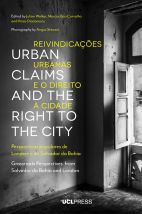Urban Claims and the Right to the City: Grassroots Perspectives from Salvador da Bahia and London

This bilingual book is several things at once. It’s a photography collection, with over 100 vibrant photos documenting the case study cities of Salvador da Bahia (Brazil) and London (UK). It’s an interview series, with a few chapters by academics but mostly told through the voices of activists. And it’s a research report, which centres but also questions the core concept of the right to the city. For instance, while the interviewees in Salvador found the “right to the city” framework resonant and useful, the respondents in London preferred alternative terminology such as “reclaim our spaces”.
Urban Claims and the Right to the City focuses on two networks in these two cities. In Salvador, Lugar Comun is a research group aiming to expand social rights of marginalized groups. For example, an association it worked with negotiated with the government for 20 years to guarantee, within a regeneration area, permanent residences of low-income families, as well as community facilities.
In London, Just Space brings together campaigners with an interest in influencing planning processes. For instance, its members have mapped community centres run by ethnic minorities, countering the financialization (generating exclusion) of low-income housing and community spaces.
Together, as the introduction states, “the concrete aim of this project is to produce a series of narratives in which grassroots activists and professionals from two contexts explain how they understand and experience a number of development concepts, and choose a set of photographic images which they feel illustrates their approach to the concepts” (page 2).
In these narratives, people speak simply and movingly about their work to achieve greater recognition and basic rights. Researcher and art curator José Eduardo Ferreira Santos describes the invisible barriers that keep dark-skinned, low-income suburbanites from accessing the amenities of central Salvador (page 26):
“these invisible borders mean we don’t access the city and what it has to offer. For example, we are ashamed of entering a museum, we are ashamed of entering a theatre, a public building. To be able to go into a heritage building you have to be doing some kind of service…It’s my city! But a foreigner comes here and he has access to everything! I mean, the city belongs more to those who are from abroad than those who are local…This is a persistently colonial idea of the city: everything for the centre and nothing for the periphery.”
Meanwhile, the state coordinator of the Homeless Movement of Bahia, Maria Lucianne Lobato Ferreira, makes her aspirations clear: “The right to the city would be to have a health clinic next to my house, a beautiful school for my daughter to study at, public transportation which isn’t as precarious as the system we have” (page 64).
In London, Ellen Clifford, the campaigns and policy manager for Inclusion London, discusses the obvious ways that the city’s spaces of power exclude those with disabilities (page 69): “we always try to get meetings in Parliament. It isn’t designed for wheelchairs, so this means we won’t fit in the room. We’ll overspill into the corridors, which makes people very visible and politicians can’t ignore that.”
And several other London respondents reflect on the ambiguous nature of “the common good”, a rhetoric that has the effect of excluding minority groups. For instance, planners and developers can invoke the common good to justify the demolition of caravan sites used by Gypsies and Travellers, to be replaced by high-rise apartment buildings. Yet “Pushing for high-density profitable development is an interpretation of common good which discriminates against those with needs and cultures that differ from the mainstream” (page 89).
All told, Urban Claims and the Right to the City is a different kind of academic work, aiming for a different kind of city.
Available open access from:
https://www.uclpress.co.uk/collections/open-access/products/131448
Further reading:
Budds, Jessica with Paulo Teixeira and SEHAB (2005), “Ensuring the right to the city: pro-poor housing, urban development and tenure legalization in São Paulo, Brazil”, Environment and Urbanization Vol 17, No 1, pages 89–113, available at https://journals.sagepub.com/doi/pdf/10.1177/095624780501700105.
Patel, Sheela, Carrie Baptist and Celine D’Cruz (2012), “Knowledge is power – informal communities assert their right to the city through SDI and community-led enumerations”, Environment and Urbanization Vol 24, No 1, pages 13–26, available at https://journals.sagepub.com/doi/full/10.1177/0956247812438366.
Search the Book notes database
Our Book notes database contains details and summaries of all the publications included in Book notes since 1993 - with details on how to obtain/download.
Use the search form above, or visit the Book notes landing page for more options and latest content.
For a searchable database for papers in Environment and Urbanization, go to http://eau.sagepub.com/

